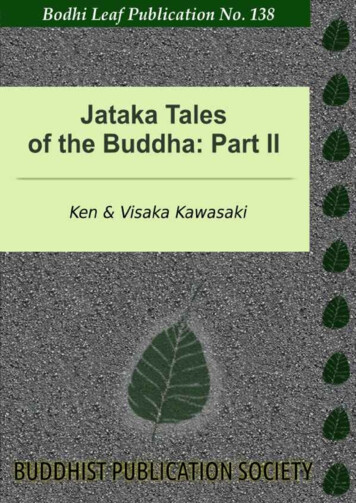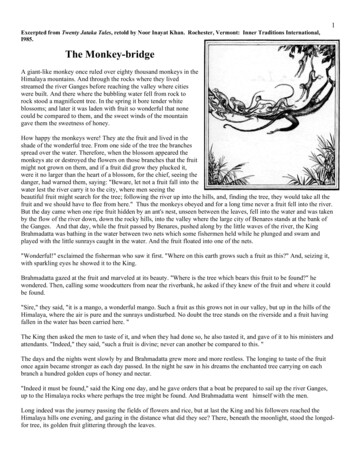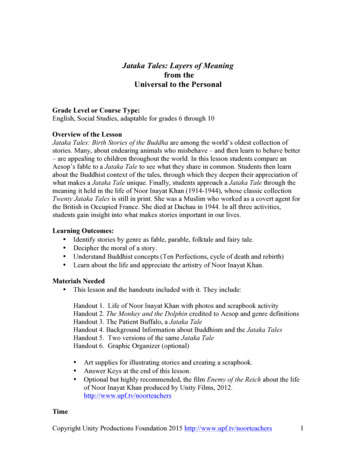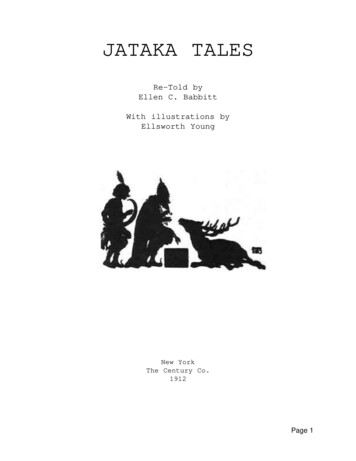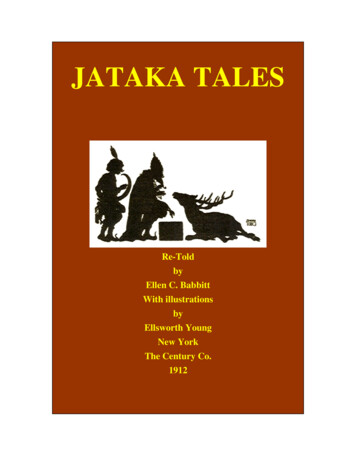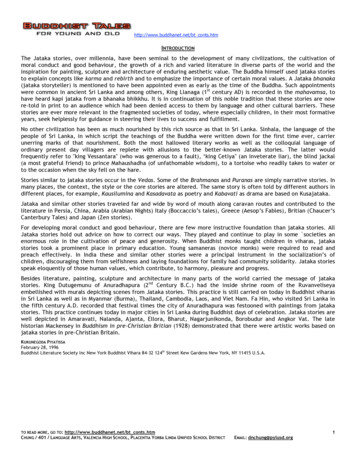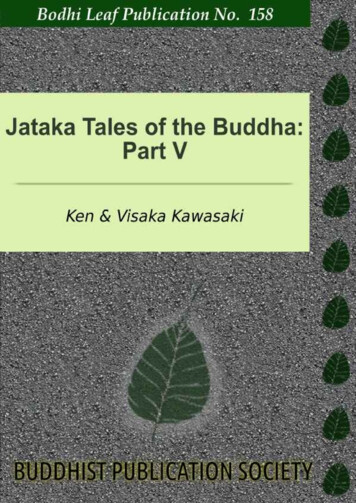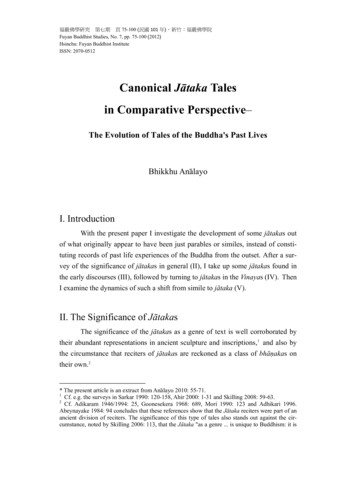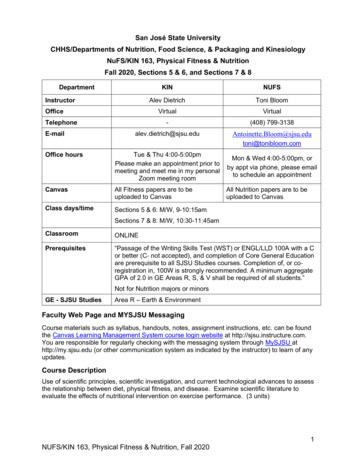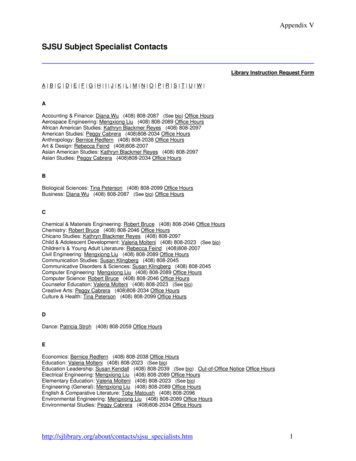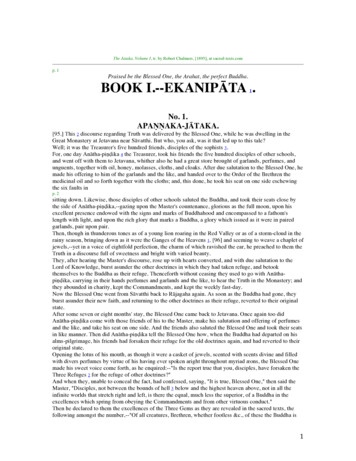
Transcription
The Jataka, Volume I, tr. by Robert Chalmers, [1895], at sacred-texts.comp. 1Praised be the Blessed One, the Arahat, the perfect Buddha.BOOK I.--EKANIPĀTA .1No. 1.APAṆṆAKA-JĀTAKA.[95.] This 2 discourse regarding Truth was delivered by the Blessed One, while he was dwelling in theGreat Monastery at Jetavana near Sāvatthi. But who, you ask, was it that led up to this tale?Well; it was the Treasurer's five hundred friends, disciples of the sophists 3.For, one day Anātha-piṇḍika 4 the Treasurer, took his friends the five hundred disciples of other schools,and went off with them to Jetavana, whither also he had a great store brought of garlands, perfumes, andunguents, together with oil, honey, molasses, cloths, and cloaks. After due salutation to the Blessed One, hemade his offering to him of the garlands and the like, and handed over to the Order of the Brethren themedicinal oil and so forth together with the cloths; and, this done, he took his seat on one side eschewingthe six faults inp. 2sitting down. Likewise, those disciples of other schools saluted the Buddha, and took their seats close bythe side of Anātha-piṇḍika,--gazing upon the Master's countenance, glorious as the full moon, upon hisexcellent presence endowed with the signs and marks of Buddhahood and encompassed to a fathom'slength with light, and upon the rich glory that marks a Buddha, a glory which issued as it were in pairedgarlands, pair upon pair.Then, though in thunderous tones as of a young lion roaring in the Red Valley or as of a storm-cloud in therainy season, bringing down as it were the Ganges of the Heavens 1. [96] and seeming to weave a chaplet ofjewels,--yet in a voice of eightfold perfection, the charm of which ravished the ear, he preached to them theTruth in a discourse full of sweetness and bright with varied beauty.They, after hearing the Master's discourse, rose up with hearts converted, and with due salutation to theLord of Knowledge, burst asunder the other doctrines in which they had taken refuge, and betookthemselves to the Buddha as their refuge. Thenceforth without ceasing they used to go with Anāthapiṇḍika, carrying in their hands perfumes and garlands and the like, to hear the Truth in the Monastery; andthey abounded in charity, kept the Commandments, and kept the weekly fast-day.Now the Blessed One went from Sāvatthi back to Rājagaha again. As soon as the Buddha had gone, theyburst asunder their new faith, and returning to the other doctrines as their refuge, reverted to their originalstate.After some seven or eight months' stay, the Blessed One came back to Jetavana. Once again too didAnātha-piṇḍika come with those friends of his to the Master, make his salutation and offering of perfumesand the like, and take his seat on one side. And the friends also saluted the Blessed One and took their seatsin like manner. Then did Anātha-piṇḍika tell the Blessed One how, when the Buddha had departed on hisalms-pilgrimage, his friends had forsaken their refuge for the old doctrines again, and had reverted to theiroriginal state.Opening the lotus of his mouth, as though it were a casket of jewels, scented with scents divine and filledwith divers perfumes by virtue of his having ever spoken aright throughout myriad æons, the Blessed Onemade his sweet voice come forth, as he enquired:--"Is the report true that you, disciples, have forsaken theThree Refuges 2 for the refuge of other doctrines?"And when they, unable to conceal the fact, had confessed, saying, "It is true, Blessed One," then said theMaster, "Disciples, not between the bounds of hell 3 below and the highest heaven above, not in all theinfinite worlds that stretch right and left, is there the equal, much less the superior, of a Buddha in theexcellences which spring from obeying the Commandments and from other virtuous conduct."Then he declared to them the excellences of the Three Gems as they are revealed in the sacred texts, thefollowing amongst the number,--"Of all creatures, Brethren, whether footless &c., of these the Buddha is1
the chief"; "Whatsoever riches there be in this or in other worlds &c."; and "Verily the chief of the faithful&c." Thence he went on to say:--"No disciples, male or female, who seek refuge in the Three Gems that areendowed with such peerless excellences, are ever reborn into hell and the like states; but, released from allrebirth into states of suffering, they pass to the Realm of Devas and there receive great glory. Therefore, inforsaking such a refuge for that offered by other doctrines, you have gone astray."p. 3(And here the following sacred texts should be cited to make it clear that none who, to find release and thesupreme good, have sought refuge in the Three Gems, shall be reborn into states of suffering:-[97] Those who have refuge in the Buddha found,Shall not pass hence to states of suffering;Straightway, when they shall quit their human frame,A Deva-form these faithful ones shall fill 1.Those who have refuge in the Doctrine found&c., &c.Those who have refuge in the Order found&c., &c.They're manifold the refuges men seek,--The mountain peak, the forest's solitude,(and so on down to)When he this refuge shall have sought and found,Entire release is his from every pain.) 2But the Master did not end his teaching to them at this point; for he went on to say:--"Disciples, meditationon the thought of the Buddha, meditation on the thought of the Truth, meditation on the thought of theBrotherhood, this it is that gives Entry to and Fruition of the First, the Second, the Third, and the FourthPaths to Bliss 3." And when he had preached the Truth to them in these and other ways, he said, "Inforsaking such a refuge as this, you have gone astray."(And here the gift of the several Paths to those who meditate on the thought of the Buddha and so forth,should be made clear by such scriptures as the following:--"One thing there is, Brethren, which, if practisedand developed, conduces to utter loathing of the world's vanities, to the cessation of passion, to the end ofbeing, to peace, to insight, to enlightenment, to Nirvana. What is this one thing?--The meditation on thethought of the Buddha.")When he had thus exhorted the disciples, the Blessed One said,--"So too in times past, disciples, the menwho jumped to the fatuous conclusion that what was no refuge was a real refuge, fell a prey to goblins in ademon-haunted wilderness and were utterly destroyed; whilst the men who clave to the absolute andindisputable truth, prospered in the selfsame wilderness." And when he had said this, he became silent.Then, rising up from his seat and saluting the Blessed One, the layman Anātha-piṇḍika burst into praises,and with clasped hands raised in reverence to his forehead, spoke thus:--"It is clear to us, Sir, that in thesepresent days these disciples were led by error into forsaking the supreme refuge. But the bygone destructionof those opinionated ones in the demon-haunted wilderness, and the prospering of the men who clave to thetruth, are hidden from us and known only to you. [98] May it please the Blessed One, as though causing thefull moon to rise in the sky, to make this thing clear to us."p. 4Then said the Blessed One:--"It was solely to brush away the world's difficulties that by the display of theTen Perfections 1 through myriad æons I won omniscience. Give ear and hearken, as closely as if you werefilling a tube of gold with lion's marrow."Having thus excited the Treasurer's attention, he made clear the thing that re-birth had concealed fromthem, as though he were releasing the full moon from the upper air, the birthplace of the snows.Once on a time in the city of Benares in the Kāsi country there was a king named Brahmadatta. In thosedays the Bodhisatta was born into a merchant's family, and growing up in due course, used to journey abouttrading with, five hundred carts, travelling now from east to west and now from west to east. There wasalso at Benares another young merchant, a stupid blockhead, lacking resource.2
Now at the time of our story the Bodhisatta had loaded five hundred carts with costly wares of Benares andhad got them all ready to start. And so had the foolish young merchant too. Thought the Bodhisatta, "If thisfoolish young merchant keeps me company all along, and the thousand carts travel along together, it will betoo much for the road; it will be a hard matter to get wood, water, and so forth for the men, or grass for theoxen. Either he or I must go on first." So he sent for the other and laid his view before him, saying, "Thetwo of us can't travel together; would you rather go first or last?" Thought the other, "There will be manyadvantages if I go on first. I shall have a road which is not yet cut up; my oxen will have the pick of thegrass; my men will have the pick of the herbs for curry; the water will be undisturbed; and, lastly, I shall fixmy own price for the barter of my goods." Accordingly he replied, "I will go first, my dear sir." [99]The Bodhisatta, on the other hand, saw many advantages in going last, for he argued thus to himself:-"Those who go first will level the road where it is rough,. whilst I shall travel along the road they havealready travelled; their oxen will have grazed off the coarse old grass, whilst mine will pasture on the sweetyoung growth which will spring up in its place; my men will find a fresh growth of sweet herbs for currywhere the old ones have been picked; where there is no water, the first caravan will have to dig to supplythemselves, and we shall drink at the wells they dug. Haggling over prices is killing work; whereas I,following later, shall barter my wares at the prices they have already fixed." Accordingly, seeing all theseadvantages, he said to the other, "Then go you first, my dear sir."p. 5"Very well, I will," said the foolish merchant. And he yoked his carts and set out. Journeying along, he lefthuman habitations behind him and came to the outskirts of the wilderness. (Now wildernesses are of thefive following kinds:--robber wildernesses, wild-beast wildernesses, drought wildernesses, demonwildernesses, and famine wildernesses. The first is when the way is beset by robbers; the second is whenthe way is beset by lions and other wild beasts; the third is when there is no bathing or water to be got; thefourth is when the road is beset by demons; and the fifth is when no roots or other food are to be found.And in this fivefold category the wilderness in question was both a drought, and a demon, wilderness.)Accordingly this young merchant took great big water-jars on his carts, and filling them with water, set outto cross the sixty leagues of desert which lay before him. Now when he had reached the middle of thewilderness, the goblin who haunted it said to himself, "I will make these men throw away their stock ofwater, and devour them all when they are faint." So he [100] framed by his magic power a delightfulcarriage drawn by pure white young bulls. With a retinue of some ten or twelve goblins bearing bows andquivers, swords and shields, he rode along to meet them like a mighty lord in this carriage, with bluelotuses and white water-lilies wreathed round his head, with wet hair and wet clothes, and with muddycarriage-wheels. His attendants, too, in front and rear of him went along with their hair and clothes wet,with garlands of blue lotuses and white water-lilies on their beads, and with bunches of white lotuses intheir hands, chewing the esculent stalks, and dripping with water and mire. Now the leaders of caravanshave the following custom: whenever the wind blows in their teeth, they ride on in front in their carriagewith their attendants round them, in order to escape the dust; but when the wind blows from behind them,then they ride in like fashion in the rear of the column. And, as on this occasion the wind was blowingagainst them, the young merchant was riding in front. When the goblin became aware of the merchant'sapproach, he drew his carriage aside from the track and greeted him kindly, asking him whither he wasgoing. The leader of the caravan too caused his carriage to be drawn aside from the track so as to let thecarts pass by, whilst he stayed by the way and thus addressed the goblin: "We are just on our way fromBenares, sir. But I observe that you have lotuses and water-lilies on your heads and in your hands, and thatyour people are chewing the esculent stalks, and that you are all muddy and dripping with wet. Pray did itrain while you were on the road, and did you come on pools covered with lotuses and water-lilies?"Hereon the goblin exclaimed, "What did you say? Why, yonder appears the dark-green streak of the forest,and thence onward there is nothing but water all through the forest. It is always raining there; thep. 6pools are full; and on every side are lakes covered with lotuses and water-lilies." Then as the line of carts[101] passed by, he asked where they were bound for. "To such and such a place," was the reply. "Andwhat wares have you got in this cart and in this?" "So and so." "And what might you have in this last cartwhich seems to move as if it were heavily laden?" "Oh, there's water in that." "You did well to carry waterwith you from the other side. But there is no need for it now, as water is abundant on ahead. So break thejars and throw the water away, that you may travel easier." And he added, "Now continue on your way, aswe have stopped too long already." Then he went a little way further on, till he was out of sight, when hemade his way back to the goblin-city where he dwelt.3
Such was the folly of that foolish merchant that he did the goblin's bidding, and had his jars broken and thewater all thrown away,--without saving so much even as would go in the palm of a man's hand. Then heordered the carts to drive on. Not a drop of water did they find on. ahead, and thirst exhausted the men. Allday long till the sun went down they kept on the march; but at sunset they un
! 1! The Jataka, Volume I, tr. by Robert Chalmers, [1895], at sacred-texts.com p. 1 Praised be the Blessed One, the Arahat, the perfect Buddha. BOOK I.--EKANIPĀTA 1. No. 1. APAṆṆAKA-JĀTAKA. [95.] This 2 discourse regarding Truth was delivered by the Blessed One, while he was dwelling in the Great Monastery at Jetavana near Sāvatthi.
